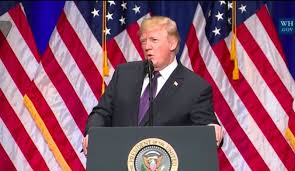Iran’s foreign ministry imposed sanctions on outgoing US President Donald Trump, US Secretary of State Mike Pompeo, and several current and former members of the Trump administration, on Tuesday.
Current American officials sanctioned include Trump, Pompeo, acting Secretary of Defense Christopher Miller, Secretary of the Treasury Steven Mnuchin, CIA Director Gina Haspel, US Special Representative to Iran and Venezuela Elliot Abrams, and Office of Foreign Assets Control (OFAC) chief Andrea Gacki.
Former Trump national security adviser John Bolton, former US envoy for Iran Brian Hook, and former Secretary of Defense Mark Esper were also sanctioned.
The US State Department told Al Arabiya English it was aware of the reports of the Iranian sanctions and called the move a “transparently political stunt.”
“This is a transparently political stunt by the Iranian government that does not deserve the seriousness of a substantive response,” a State Department spokesman told Al Arabiya English.
Iran sanctioned the officials for their alleged involvement in the killings of top Iranian military commander Qassem Soleimani and nuclear scientist Mohsen Fakhrizadeh, as well as “supporting acts of terror against Iran” and imposing sanctions against the Islamic republic, the semi-official ISNA news agency cited foreign ministry spokesman Saeed Khatibzadeh as saying.
The sanctions are based on a law that was approved by Iran’s parliament in 2017, meant to “confront America’s human rights violations and adventurist and terrorist acts in the region.”
According to the law, sanctioned individuals are not allowed entry to Iran, any assets they own within the Islamic republic are confiscated, and their bank accounts in the country are frozen.
Last month, Iran also blacklisted the US ambassador in Yemen, one day after Washington imposed terrorism-related sanctions on Tehran’s envoy to the Yemeni Houthis.
Tensions between Iran and the US have escalated since Trump pulled out of the 2015 nuclear deal and reimposed crippling sanctions on Tehran in 2018 as part of a “maximum pressure” campaign.
Experts argue the maximum pressure campaign has created leverage for US President-elect Joe Biden to negotiate a better nuclear deal.
Biden has pledged to rejoin the accord if Iran returns to complying with it. However, his incoming Director of National Intelligence Avril Haines said the US is not close to rejoining the deal during her confirmation hearing on Tuesday.
Source : Iran News







